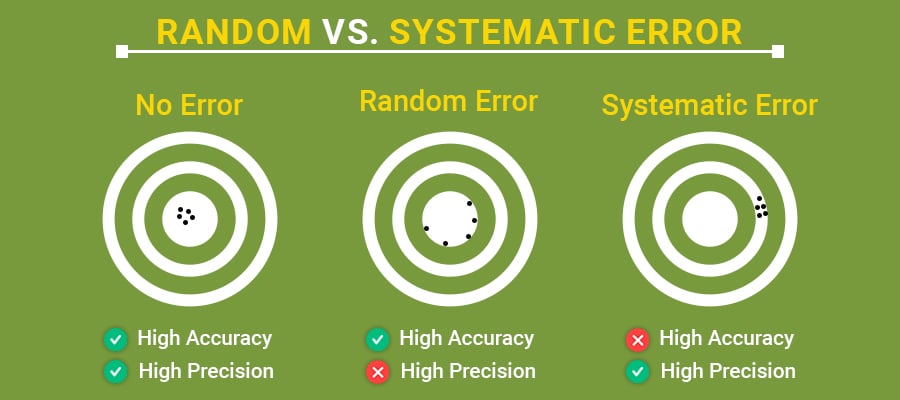 Offers
New
Order Now
Offers
New
Order Now
Do you also struggle with random and systematic errors in your experiments? Your answer must be yes because no matter how careful you are, there is always some margin of error. So, it is common for a student to face such mistakes. While doing any experiment or research, you may commit a few measurement errors. It means the difference between the actual value and the observational value of something. It has two significant parts random errors and systematic errors. However, do you know the meaning of random vs. systematic error? If not, then read the following write-up to know about it.
Random errors are unpredictable and unavoidable, you can not do anything about them. There are three significant sources of random errors observer variability, instrument variability and variability. These are mainly due to environmental conditions or inescapable circumstances. They are also called unsystematic error, random variation and system noise. So, now you must have understood the random error meaning from the above description. Now, go through its examples for further understanding.
Get Research Help Now!Explore the following examples of random error for avoiding them the next time you carry out your research.
The above examples of random errors must be clear to you. Now, as you know, precision in measurement is crucial, thus, you should learn how you can reduce such errors. Read the following solutions for further information.
The following pointers will help you to reduce random errors in your scientific research.
Generally, such errors occur due to our carelessness and unawareness. So, try to be more precise while you carry out your research. Be careful and do one thing at a time, do not multitask, as it leads to stress and division of attention.
It is proven that if you have more data to work on, there will be fewer chances of errors. Therefore, if possible, increase the volume of samples, and you will see consistent results out of this.
Increase the number of measurements because when you measure the same thing more frequently, you become more accurate. So you will have fewer chances of committing random errors.
The above-mentioned solutions can help you to reduce random errors. Now move to the next part, where you will learn about systematic error meaning.
Unlike random errors, systematic errors are predictable and influence the measurement. However, there is no systematic error definition as such, it is just part of measurement error. Such errors are also called bias due to the nature of presenting the data in a standardized way, which leads to inaccurate results. For example; if you have measured the same thing several times, it would be different each time. In addition, if you want to understand systematic errors properly, read the following part.
Read the following examples to get an idea of systematic errors.
The above-mentioned examples must have helped you to understand systematic errors and how they occur. Now, go through the following section to know how you can reduce them.
Read the following solutions to solve the problem of systematic errors in your scientific research for error-free measurement.
This method is just like its name in that you have to blind the researchers and the participants from the condition of the tool of the experiment. It might influence them to act in a certain way, and your experiment can be effortless.
When you do any research, frequently compare what you have measured with the accurate measurement. It helps you figure out the gap, and you can fill that for better results.
This method means devising different techniques of measurement so you can figure out the best one. Therefore, with the availability of diverse options, you will be able to carry out accurate results from your research.
We have provided the above solutions that you can use in your research to minimize systematic errors. Nevertheless, in the next section, you will learn about the differences between random and systematic errors.
The pivotal difference between the two is that random errors lead to unpredictable fluctuation in the measurement and systematic error is a predictable change in the measurement value. Both are part of measurement errors and are very common in scientific research.

Random errors are also known as unavoidable errors, while systematic errors can not be avoided. They both are bad for the research process, but if we compare the repercussions of both, the systematic error surpasses the random error.
Systematic errors are generally challenging to spot, as the change in the measurement will be proportional and consistent. But, they can be avoided, unlike random errors. Therefore, you should notice such mistakes to become more accurate. However, you may also read random vs systematic error examples for a proper understanding of them.
The above discussion about the differences between random and systematic errors must be clear to you. However, do you know which measurement error affects your observation more? If you want to know which error between the two affects your measurement more, go through the following section.
Generally, both errors affect the research part negatively, as they affect the overall results of the measurement. However, if we compare both of them, then the systematic error is more problematic for the research. As, they affect your observation consistently leading to inaccurate results. In addition, these are difficult to notice and also tricky to avoid. On the other hand, random errors affect your measurement in various directions. In addition, they cancel out the existing shortcomings in the long run.
You must understand which error between random error and systematic error is worse. So, now you can apply these in your research process for academic tasks. However, if you still find it challenging, you can take assignment help for an effortless experience. If you want to know more about it, read the following section.
The above write-up must have provided insightful knowledge about the meaning, definition and differences between random vs. systematic error. However, if you still face this problem and can not get far from the measurement process, you can seek our experts' assistance. Our professionals will help to carry out effortless experimental research without any lingering errors. So, contact Global Assignment Help Australia to get the best assignment help at affordable prices.
You May Also like to Read-
Conclusive Peel Writing Strategy to Ace your Essays
How to Write a 5-Paragraph Essay?
Flip the Script with These Must Know Persuasive Writing Topics
Don't Miss Out-Order Now!
Grab this exclusive offer and start your journey to savings today! Act quickly, as this special offer won't be around for long!

This blog explains what is a hyperbole, provides engaging examples, & explores how to use hyperbole.

Explore 150+ funny debate topics to spark laughter, creativity, and lively discussions in 2025

Cross-Sectional Study basics explained with steps, examples, and comparisons.
Limited Time Offer
Exclusive Library Membership + FREE Wallet Balance
1 Month Access !
5000 Student Samples
+10,000 Answers by Experts
Get $300 Now
Update your Number
